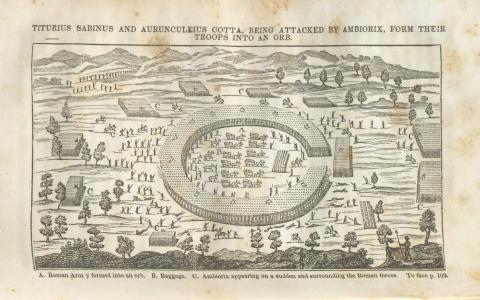Tum dēmum Titūrius, quī nihil ante prōvīdisset, trepidāre et concursāre cohortēsque dispōnere, haec tamen ipsa timidē atque ut eum omnia dēficere vidērentur; quod plērumque eīs accidere cōnsuēvit quī in ipsō negōtiō cōnsilium capere cōguntur. At Cotta, quī cōgitāsset haec posse in itinere accidere atque ob eam causam profectiōnis auctor nōn fuisset, nūllā in rē commūnī salūtī deerat et in appellandīs cohortandīsque mīlitibus imperātōris et in pūgnā mīlitis officia praestābat. Cum propter longitūdinem āgminis minus facile omnia per sē obīre et quid quōque locō faciendum esset providēre possent, iussērunt prōnūntiāre ut impedīmenta relinquerent atque in orbem cōnsisterent. Quod cōnsilium etsī in ēiusmodī cāsū reprehendendum nōn est, tamen incommodē accidit: nam et nostrīs mīlitibus spem minuit et hostēs ad pūgnam alācriōrēs effēcit, quod nōn sine summō timōre et dēspērātiōne id factum vidēbātur. Praetereā accidit, quod fierī necesse erat, ut vulgō mīlitēs ab sīgnīs discēderent, quaeque quisque eōrum cārissima habēret ab impedīmentīs petere atque arripere properāret, clāmōre et flētū omnia complērentur.

